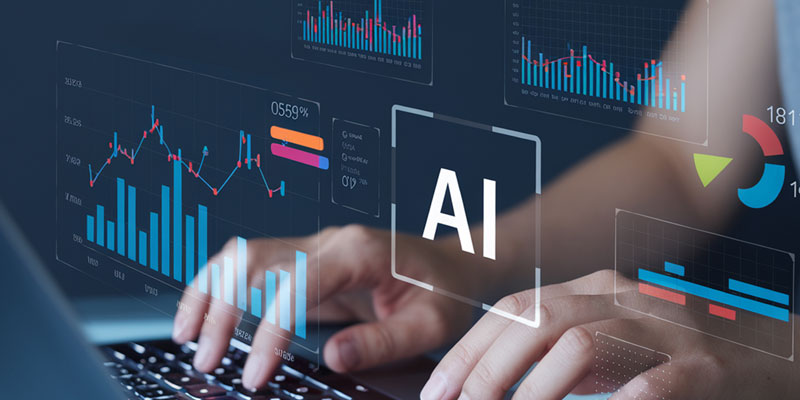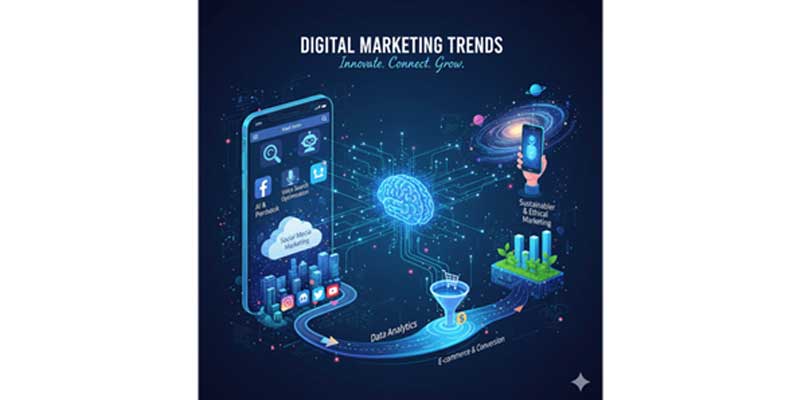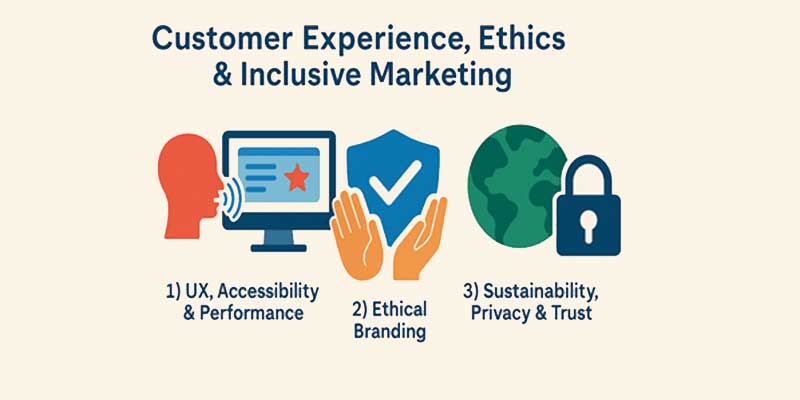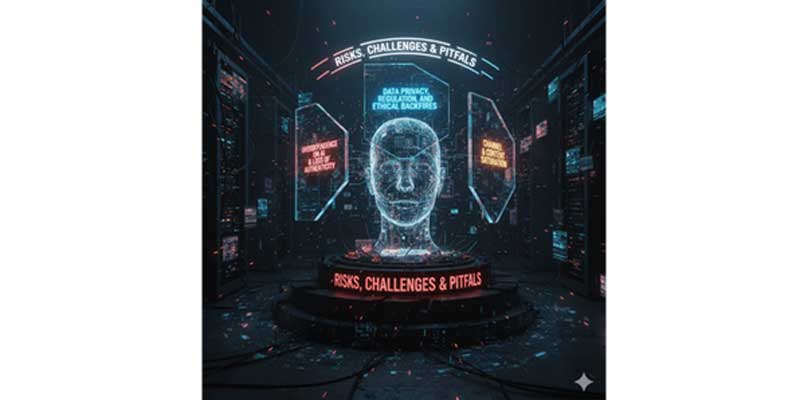

The year 2025 marks a defining shift in how brands approach marketing. Unlike previous years, the pace of change is being accelerated by a rare combination of technological advancements, evolving consumer expectations, and new regulatory frameworks. Businesses that once relied on traditional digital strategies are realizing that incremental adjustments are no longer enough; they need transformative thinking. This makes 2025 a turning point where marketing leaders must recalibrate their strategies to remain relevant, competitive, and trusted.
Consumers in 2025 are more connected, informed, and demanding than ever before. They are no longer satisfied with generic content or one-size-fits-all campaigns. Personalization has become an expectation, not a luxury, and audiences seek experiences that feel authentic, relevant, and tailored to their individual needs.
Additionally, people are increasingly conscious of the values behind the brands they support. They look for transparency, ethical sourcing, inclusivity, and sustainability. With younger generations—especially Gen Z and the emerging Gen Alpha—taking center stage, digital natives are influencing how brands must communicate: fast, authentic, and aligned with cultural moments.
The regulatory environment in 2025 has grown more stringent, reshaping how businesses collect and use data. Stricter privacy laws and evolving frameworks like GDPR updates and region-specific policies are forcing marketers to prioritize consent, transparency, and secure data handling. Third-party cookies are no longer a viable option, leading to increased focus on first-party data strategies.

Beyond compliance, ethical considerations are also shaping brand decisions. Audiences hold companies accountable for misuse of data, lack of inclusivity, or misleading practices. Marketers are finding that building trust through ethical actions and clear communication is just as important as delivering results.
Technology is the strongest driver of change in 2025. Artificial intelligence, particularly generative AI, is revolutionizing content creation, customer engagement, and predictive analytics. Brands are using AI agents to automate workflows, deliver hyper-personalized campaigns, and even simulate customer journeys before execution.
Alongside AI, immersive technologies like AR and VR are redefining customer experiences. From virtual try-ons in e-commerce to interactive brand events in virtual spaces, businesses are blurring the lines between digital and physical engagement. Add to this the rise of social commerce, voice search, and advanced analytics tools, and it’s clear that marketers must embrace innovation to remain competitive.
Through AI technology, brands will achieve exceptional customer personalization at a high level. Through AI algorithms, brands will provide personalized content which empowers them to connect with users through meaningful engagements.
The future development will be to use an AI-driven chatbot to deliver high-end real-time support alongside individualized communication that will help improve customer retention and satisfaction levels.
AI systems will help marketing teams predict customer behaviour and help refine audience divisions and improve campaign results to enhance profitability.
Generative AI has revolutionized content production by helping marketers generate text, visuals, videos, and even campaign ideas at scale. What once required teams of specialists can now be achieved with AI-powered tools that adapt to brand voice and audience preferences.
But the true value lies in personalization. AI enables brands to analyze customer data in real time and deliver content that resonates with each individual. From dynamic website experiences to personalized product recommendations, consumers now expect brands to “know them” and anticipate their needs. This shift means personalization is no longer a competitive advantage—it’s the baseline for meaningful engagement.
Voice assistants, chatbots, and multimodal interfaces are redefining how people interact with brands. Conversational AI is becoming smarter, capable of holding nuanced dialogues, resolving customer queries instantly, and guiding purchase decisions.
Digital marketing requires voice search as consumers make more frequent use of voice assistant devices such as Alexa Google Assistant and Siri. Businesses working on marketing strategy will direct efforts toward voice search optimization as well as the creation of long-tail keyword content. Meanwhile, the integration of voice search and multimodal interfaces—where users combine voice, text, image, and even gestures—offers marketers entirely new engagement opportunities. For instance, a customer might ask a smart assistant for product recommendations while scanning a visual catalog, creating a richer and more intuitive discovery process. Companies that optimize for these channels will gain a clear advantage in capturing modern audiences.
AI agents are becoming digital co-workers, handling tasks like campaign scheduling and ad spend optimization with speed and precision. They also enhance marketing mix modeling and attribution by analyzing cross-channel data in real time, identifying each touchpoint’s impact, and recommending budget shifts to maximize ROI—allowing human teams to focus on creativity and strategy.
Short-form video continues to dominate attention spans, with platforms like Instagram Reels, TikTok, and YouTube Shorts leading the charge. Shoppable videos are particularly powerful, blending entertainment with instant purchasing opportunities. Brands now have the ability to turn a simple video into a direct sales channel, making the path from discovery to purchase seamless.
The emphasis is on bite-sized, engaging, and visually compelling content that communicates brand stories quickly while capturing viewer attention. This approach is especially effective for younger audiences who expect content to be mobile-friendly, highly visual, and instantly actionable.
The adoption of immersive technologies is revolutionizing customer engagement. Due to the rising popularity of AR and VR technology, brands will provide customers with virtual try-ons and immersive experiences that improve user engagement, particularly in the fashion, beauty, and home décor industries.
Furthermore, Virtual Reality technology will develop new methods to conduct digital events, exhibitions, and conferences which eliminate geographical distance. This opens avenues for global audience participation, interactive product showcases, and experiential marketing campaigns that were previously limited by physical constraints. By integrating AR and VR, marketers create memorable experiences that build stronger brand loyalty and drive deeper engagement.
Influencer marketing continues to evolve beyond celebrity endorsements. Companies will work with modest influencers who target dedicated follower groups noted for their connection with the content. The credibility of such influencers will grow leading audiences to trust them more. Nano and micro-influencers offer highly engaged communities, making them a strategic choice for brands seeking authentic connections over broad reach.
Additionally, artificial influencers modeled through AI driven technology present the potential for major changes in the market thus brands aim to embrace this innovation for reaching tech-centric consumers. These AI-created personalities allow companies to experiment with innovative storytelling, highly controlled messaging, and scalable campaigns that can engage audiences in entirely new ways.
Social commerce is evolving into a primary sales channel for brands. The online business functionality of Instagram along with Facebook and TikTok and Pinterest will become stronger through platform evolution. Users will be able to make online purchases from any medium of social media including posts and advertisements and stories.
Live-streaming sales events are also becoming a key component of this strategy. Live-streaming sales events will persist as an essential business practice for influencers to join forces with brands while directly engaging their customer base. These approaches allow brands to convert engagement into purchases instantly, creating a seamless and interactive shopping experience.
Messaging apps like WhatsApp, Telegram, and private community platforms are transforming customer communication. Brands are leveraging these channels to provide personalized support, exclusive offers, and interactive experiences. By moving beyond traditional social media, companies can foster deeper engagement and build trust with highly engaged, smaller audiences.
Private communities also enable brands to create a sense of exclusivity, driving loyalty while collecting valuable feedback that informs product development and marketing strategies.
In 2025, the focus is on creating a unified customer journey where every touchpoint—from social media and messaging apps to e-commerce platforms and in-store experiences—works cohesively. Marketers are investing in integrated systems that track interactions across devices and platforms, allowing them to anticipate customer needs, deliver consistent messaging, and optimize conversions.
By adopting omnichannel and multichannel strategies combined with advanced social commerce tools, brands can offer a frictionless experience that meets modern consumers’ expectations while maximizing engagement and revenue potential.
The digital marketing landscape in 2025 is increasingly AI-driven, fundamentally changing how users discover content and how brands optimize their presence. Search engines and discovery platforms now leverage advanced AI algorithms to prioritize relevance, personalization, and user intent. This AI-first approach requires marketers to rethink traditional SEO practices and embrace more intelligent, data-driven strategies.
Consumers are interacting with search engines in new ways. Voice search is becoming a standard mode of inquiry, especially on mobile devices and smart home assistants. Visual search, powered by AI, allows users to find products and information using images rather than keywords, creating opportunities for brands to optimize visual content across platforms.
Additionally, zero-click results—where search engines provide answers directly on the results page—are increasingly common. Marketers now focus on optimizing for featured snippets, knowledge panels, and other rich result formats to ensure brand visibility even when users do not click through to a website.
With the retirement of Universal Analytics, Google Analytics 4 (GA4) has become the standard for measuring digital performance. GA4 offers event-based tracking, cross-platform insights, and enhanced AI-driven predictions that help marketers understand user behavior in more granular ways.
Marketers can now track the entire customer journey—from initial touchpoints on social media to conversions on e-commerce platforms—allowing for more accurate attribution and better-informed strategy adjustments. This shift emphasizes data-driven decision-making and ensures that marketing investments are both efficient and effective.
Marketing Mix Modelling (MMM) evaluates the impact of marketing channels on business performance by analyzing historical data from TV, digital ads, social media, email, and promotions. In 2025, AI-enhanced MMM uses real-time, granular data to predict the effects of budget reallocations, helping marketers identify high-ROI efforts. Combined with advanced attribution models, MMM offers a complete view of customer interactions, revealing which campaigns drive incremental revenue and the optimal mix of traditional and digital marketing, ensuring efficient, growth-focused strategies.

User experience (UX) remains a critical differentiator for brands. Websites and digital platforms must not only load quickly and navigate seamlessly but also be accessible to all users, including those with disabilities. Mobile-first events will become the main priority for marketers since mobile internet usage continues to grow thus requiring them to optimize website content and digital advertisements specifically for mobile viewing.
Optimized UX ensures that every touchpoint—from landing pages to e-commerce checkouts—is intuitive and frictionless, reducing bounce rates and improving engagement. Speed, mobile friendliness, and accessibility are no longer optional—they are expected standards for delivering a satisfying digital experience.
Inclusivity and representation are central to building trust and loyalty in 2025. Consumers increasingly evaluate brands based on how authentically they reflect diverse audiences in their messaging, visuals, and campaigns. Ethical branding, including transparency in operations, honest communication, and responsible marketing practices, strengthens consumer confidence and fosters long-term relationships.
By 2025, the digital marketing landscape will be dominated by technological solutions that combine true personalization with consumer-oriented experiences. Sustainability, data privacy, and trust have become critical differentiators. Brands that prioritize eco-friendly practices, safeguard consumer data, and maintain transparency will resonate more strongly with audiences. By integrating these principles into marketing strategies, companies can ensure long-term relevance and foster loyal customer communities.
Mobile devices remain the primary gateway to the internet in India and similar emerging markets. Marketers are prioritizing mobile-first strategies, optimizing websites, apps, and advertisements for small screens and low-bandwidth conditions. Content must load quickly, perform seamlessly even on slower connections, and provide clear calls-to-action to maximize engagement.
Regional content adaptation is equally important. Brands that localize messaging into vernacular languages, while respecting regional contexts, gain higher acceptance and resonance among audiences. This approach ensures inclusivity and broadens reach beyond urban, English-speaking populations.
Influencer marketing in India has evolved to include nano and micro-influencers who maintain strong connections with their communities. Local influencers, vernacular content, and culturally nuanced campaigns enable brands to build authentic relationships with diverse audiences. These influencers often have deep knowledge of local trends, festivals, and behaviors, helping brands connect in ways that national campaigns may not achieve.
Creating culturally relevant content that aligns with local traditions, humor, and storytelling norms increases trust, engagement, and conversions. By tapping into regional creativity, brands can foster loyalty among highly targeted audiences.
India’s e-commerce sector continues to grow rapidly, fueled by rising internet penetration, mobile payments, and social commerce. Social media platforms like Instagram, Facebook, TikTok, and Pinterest are evolving as integrated shopping ecosystems, allowing users to discover and purchase products without leaving the app.
Live-streaming commerce events and in-app marketplaces are particularly effective for engaging Indian consumers, offering interactive experiences and instant purchasing options. Brands that combine social commerce, regional content, and influencer partnerships can capitalize on this growth while delivering highly personalized, culturally relevant experiences.
By embracing mobile-first optimization, local influencer strategies, and social commerce trends, marketers can create impactful campaigns that resonate with India’s diverse and digitally active population.
Not every emerging trend warrants full-scale adoption. Marketers must differentiate between experimental trends and those that should be fully integrated into business strategy. Short-form video, AI-driven personalization, and social commerce may be ready for full adoption, while nascent technologies like AI-generated influencers or advanced VR experiences may require testing before scaling.
By prioritizing trends strategically, brands can allocate resources efficiently, reduce risk, and focus on innovations that deliver measurable ROI. This approach ensures agility while avoiding wasted investment in unproven tactics.
Successful adoption of 2025’s marketing trends relies on talent and technology. Companies must invest in upskilling teams to handle AI, data analytics, immersive technologies, and cross-platform marketing.
Equally important is implementing the right tools and infrastructure. Marketing automation platforms, AI analytics engines, and omnichannel management solutions enable teams to execute campaigns efficiently and gain actionable insights. Brands that build both human and technological capabilities position themselves for long-term success in a complex digital environment.
Continuous experimentation is key to thriving in a rapidly evolving marketing landscape. Brands must establish feedback loops, monitor performance, and adapt campaigns in real time.
Data-driven optimization allows marketers to identify high-performing strategies, refine messaging, and reallocate resources toward the most effective channels. By embracing a culture of testing and learning, businesses can respond quickly to shifting consumer behaviors and capitalize on emerging opportunities, ensuring sustained growth and competitive advantage.

AI-powered tools are revolutionizing marketing, but overreliance can lead to a loss of human touch and brand authenticity. Consumers still value genuine interactions and relatable messaging. Brands must balance automation with creativity and personal engagement to maintain meaningful connections. Overusing AI-generated content or automated customer interactions without oversight may risk alienating audiences and reducing brand loyalty.
Data privacy concerns will force brands to disclose their practices for customer data collection and use to consumers. Companies that follow GDPR and CCPA standards will maintain essential operational integrity. Transparency is key: audiences expect clarity on how their data is collected, stored, and utilized, and brands that fail in this regard risk reputational damage and regulatory penalties.
Brands must follow ethical business tenets as consumers seek sustainable endeavors alongside workforce diversity and corporate involvement. People will use ethical branding standards when making their purchase selections. Marketers need to integrate ethical practices into every aspect of operations—from advertising claims to product sourcing—to align with consumer expectations and protect brand reputation.
As more brands adopt similar digital strategies, channels and content formats are becoming increasingly crowded. Excessive advertising or repetitive messaging can fatigue audiences, lowering engagement and reducing campaign effectiveness.
To stand out, marketers must focus on differentiated messaging, creative storytelling, and strategic channel selection. Personalization, audience segmentation, and interactive formats are essential tools to overcome saturation and maintain meaningful engagement in a competitive landscape.
Emerging technologies like Web3, blockchain, and quantum computing are set to transform digital marketing infrastructure. Through blockchain implementation, organizations can build lasting relations with better transparency structures as well as build trust levels primarily for fighting digital marketing exploit schemes and safeguarding user data.
Decentralized identity management tools will redefine customer relationships, giving consumers more control over their data. Decentralized identity management tools will define new ways for businesses to connect with their customers because consumers desire increasing data control online. These technologies not only enhance trust but also open opportunities for innovative marketing models, loyalty programs, and secure transactions.
The next generation of consumers—Gen Z and Gen Alpha—places increasing importance on sustainability, ethics, and personalization. People today align with brands that emphasize sustainability along with green business practices. Brands will emphasize displaying their sustainable products together with responsible production methods along with organizational sustainability efforts. Marketers must adapt messaging, products, and experiences to resonate with these digitally native audiences.
Next-generation interfaces will reshape how audiences interact with digital content. The metaverse, wearable technology, and even implantable devices will create immersive, always-connected experiences. Brands that explore these channels can engage consumers in interactive environments, offering virtual trials, gamified experiences, and personalized services.
An increasing number of brands will adopt transparency programs to show their carbon emissions while giving their stakeholders visibility into environmental responsibility. Integrating sustainability reporting into futuristic interfaces allows brands to combine technological innovation with ethical practices, strengthening trust while delivering compelling experiences.
By embracing emerging technologies, anticipating the preferences of future generations, and exploring next-gen interfaces, marketers can position themselves to lead in a post-2025 landscape where transparency, engagement, and innovation converge.
Digital marketing trends will keep changing. But following them and being aware of them will give us an upper hand. It will help to take advantage of the trends early on to get the best and maximum value out of the trends. The digital experts at Bud, a digital marketing company in Bangalore and also a performance marketing agency Bangalore, can help you stay on top of trends and derive the best value out of marketing efforts.